人教版(2019)选择性必修 第四册Unit 5 Launching Your Career using language(1)—listening and speaking 课件 (共18张PPT)
文档属性
| 名称 | 人教版(2019)选择性必修 第四册Unit 5 Launching Your Career using language(1)—listening and speaking 课件 (共18张PPT) | 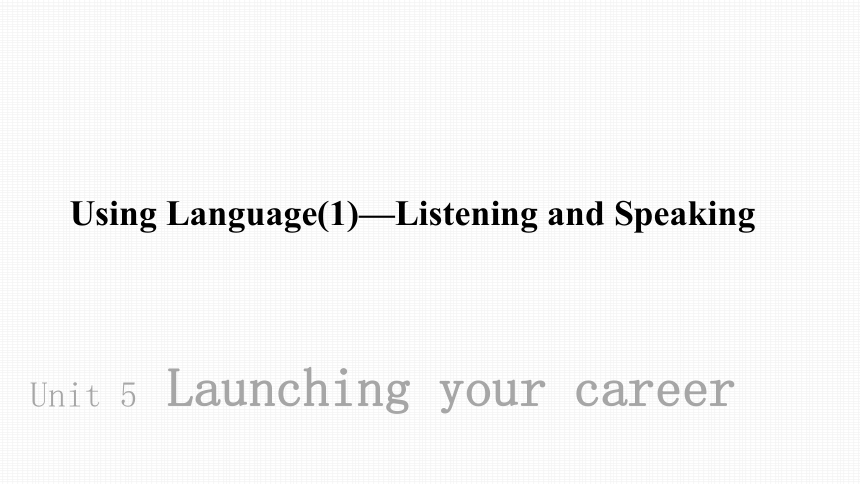 | |
| 格式 | pptx | ||
| 文件大小 | 13.0MB | ||
| 资源类型 | 教案 | ||
| 版本资源 | 人教版(2019) | ||
| 科目 | 英语 | ||
| 更新时间 | 2024-04-11 19:05:33 | ||
图片预览

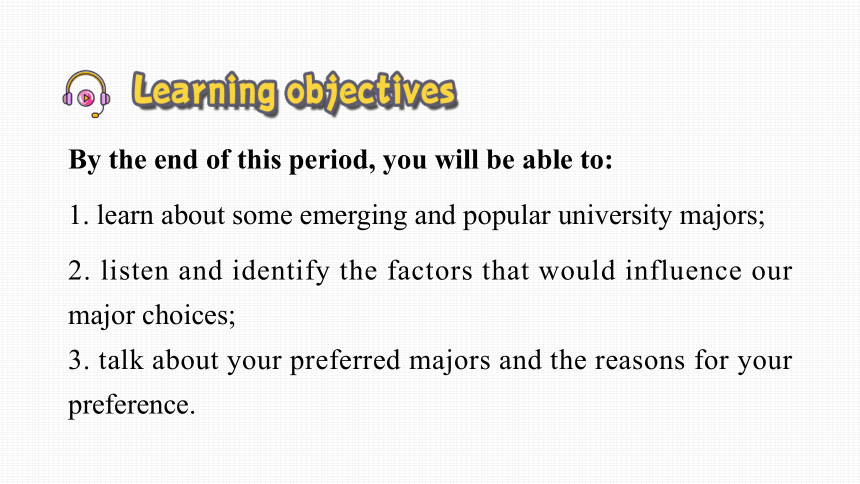
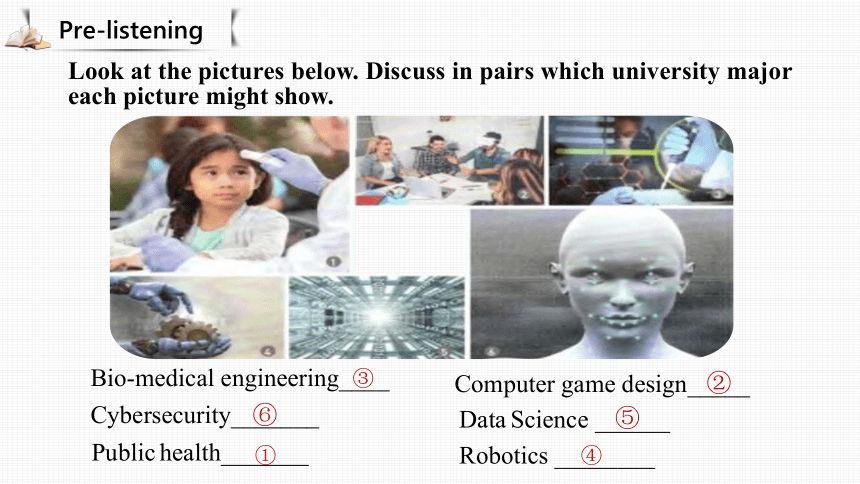
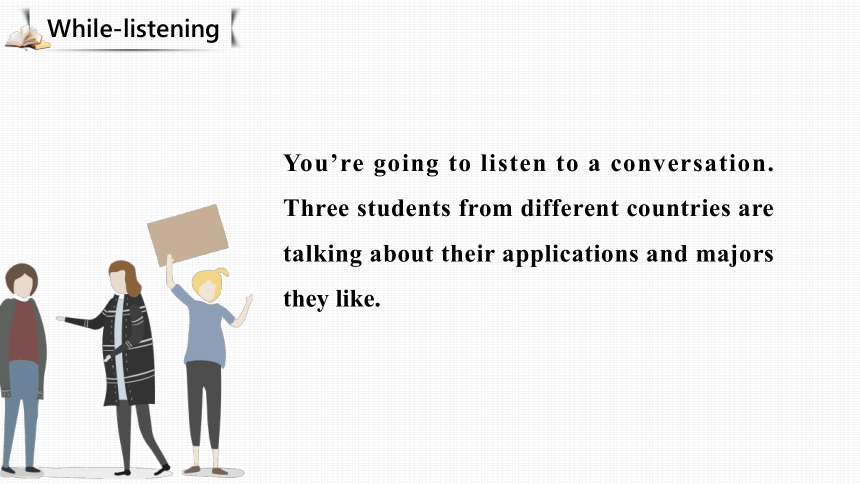
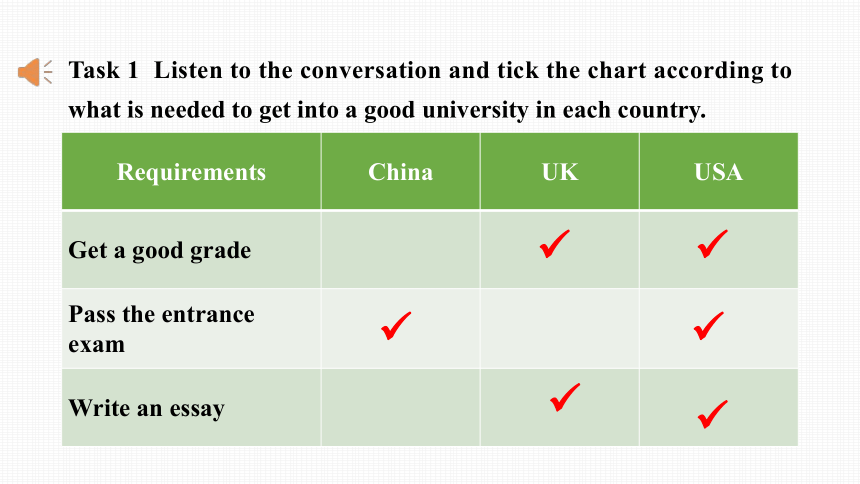
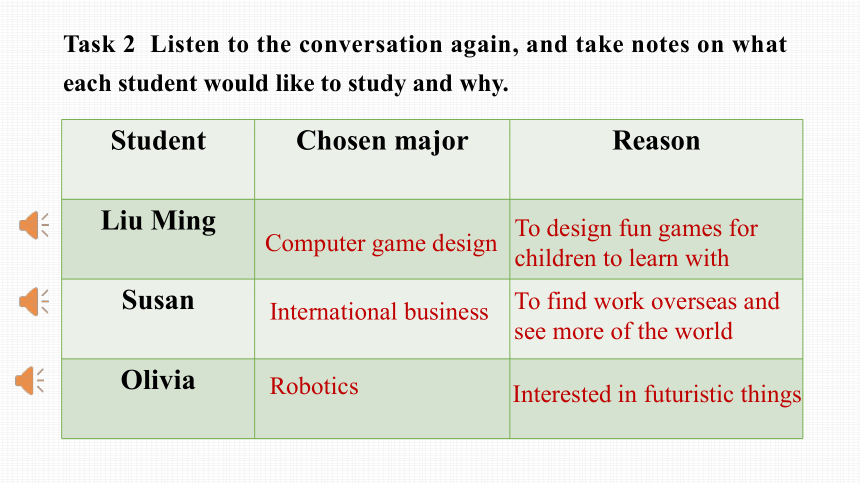
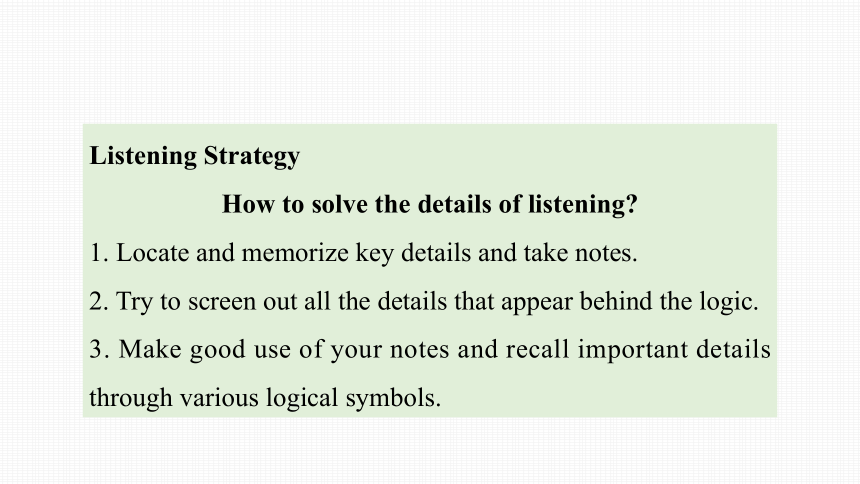
文档简介
(共18张PPT)
Using Language(1)—Listening and Speaking
Unit 5
Launching your career
By the end of this period, you will be able to:
1. learn about some emerging and popular university majors;
2. listen and identify the factors that would influence our major choices;
3. talk about your preferred majors and the reasons for your preference.
Bio-medical engineering____
Computer game design_____
Cybersecurity_______
Data Science ______
Public health_______
Robotics ________
①
②
③
④
⑤
⑥
Pre-listening
Look at the pictures below. Discuss in pairs which university major each picture might show.
You’re going to listen to a conversation. Three students from different countries are talking about their applications and majors they like.
While-listening
Requirements China UK USA
Get a good grade
Pass the entrance exam
Write an essay
Task 1 Listen to the conversation and tick the chart according to what is needed to get into a good university in each country.
Student Chosen major Reason
Liu Ming
Susan
Olivia
Task 2 Listen to the conversation again, and take notes on what each student would like to study and why.
Computer game design
To design fun games for children to learn with
International business
To find work overseas and see more of the world
Robotics
Interested in futuristic things
Listening Strategy
How to solve the details of listening
1. Locate and memorize key details and take notes.
2. Try to screen out all the details that appear behind the logic.
3. Make good use of your notes and recall important details through various logical symbols.
1. What did Liu Ming say about cybersecurity and data science
2. What did Susan say she was told
3. What did Olivia say they need to do to get into good universities
Task 3 Listen to the conversation again, and answer the questions below.
1. What did Liu Ming say about cybersecurity and data science
They are really fascinating subjects if you are good at computer programming.
2. What did Susan say she was told
There is no point in choosing a subject that you like but you are not good at it.
3. What did Olivia say they need to do to get into good universities
We need to start studying even harder.
I read that...
I was told that...
Check your answers.
Listening Strategy
Identify references
When we speak, we often refer to someone else’s opinion or what we have heard, read, or been told. When expressing this in speech, we use phrases such as I heard/read that..., according to..., I was told that..., etc.
Listening text
Liu Ming: Hi, Susan! Hi, Olivia! I’ve been thinking a lot recently about university. Have you guys made any plans yet
Susan: Hi, Liu Ming! I guess I've thought about it, but I haven’t made any firm plans yet. How about you, Olivia
Olivia: The same. My parents said that my future career might depend on what university I end up getting into.
Liu Ming: If I had a chance, I’d love to go to a top Chinese university. But it's so hard. I need a really high score to pass the National College Entrance Exam.
Susan: Oh, in the UK, we don’t have a university entrance exam. We take a separate exam for each subject that we study. Then we use our grades to apply to a university. We also have to give a long essay to the university saying why we want to study our chosen subject.
Olivia: Well, in the US, we need to get really high grades and we need to take a college entrance exam. Plus we have to write an admission essay.
Liu Ming: So,we must all study extra hard, then. I really want to major in computer game design. I’d like to design fun games for children to learn with.
Susan: That’s a great idea! I’d like to study international business. According to the school’s careers advisor, it could help me find work overseas. It would be great to see more of the world!
Olivia: Hmm. . . I’m not sure what I want to study as my major yet. But right now I’m thinking about robotics. I’m really interested in futuristic things.
Liu Ming: How about cybersecurity or data science I read that they’re really fascinating subjects if you’re good at computer programming. But I’m hopeless at programming!
Susan: That’s a good point. I was told that there’s no point choosing a subject that you like but you’re not very good at.
Olivia: Yes, and don’t forget that where you study is also important, too. I’m planning on taking a few campus tours to see what the atmosphere and facilities are like.
Liu Ming: Good idea! I really hope that we can all find good universities.
Susan: Me, too. I hope we are all lucky and find great universities.
Olivia: Luck Ha-ha! I think we all need to start studying even harder, too!
Expressing choices, wishes, intentions and opinions
I’d choose...because... My goal/dream is to...
If possible, I’d really like to... I plan/hope/wish to...
I’m not sure if that suits you, because... I’ve always wanted to...
I think that is really difficult because...
I think you are really suited to that because...
That’s a good choice, but I think you should...
Are you sure that’s a good choice Have you thought about..
I’m not sure what I want to study yet, but right now I’m thinking about...because...
In pairs, tell each other about the major(s) you would like to choose.
Post-listening
A: What major will you choose in university
B: I’m not really sure yet. My goal is to work at a large company, so I guess Business administration.
A: Are you sure that’s a good choice Most of the people I know who are working at large companies majored in something else. And a lot of companies want employees with different education backgrounds, as they have different skills and points of view.
B: So, what would you suggest
A: Have you thought about history You love that subject.
B: That’s a good choice, but I still think I should study something more useful for my future career. What about you What major will you choose
A: I plan to study nutrition and child health after I go to medical school.
B: So, you want to be a doctor
A: Yes, if possible, I’d really like to become a pediatrician.
B: Wow! I think that might be quite difficult for you. Your grades in science have been weak so far.
A: That might be true, but it is my dream. I’ll study harder when it comes to science from now on.
B: What if it doesn’t work out
A: Well, I’ll just have to cross that bridge when I come to it.
Finish the exercise that is given today.
Homework
Using Language(1)—Listening and Speaking
Unit 5
Launching your career
By the end of this period, you will be able to:
1. learn about some emerging and popular university majors;
2. listen and identify the factors that would influence our major choices;
3. talk about your preferred majors and the reasons for your preference.
Bio-medical engineering____
Computer game design_____
Cybersecurity_______
Data Science ______
Public health_______
Robotics ________
①
②
③
④
⑤
⑥
Pre-listening
Look at the pictures below. Discuss in pairs which university major each picture might show.
You’re going to listen to a conversation. Three students from different countries are talking about their applications and majors they like.
While-listening
Requirements China UK USA
Get a good grade
Pass the entrance exam
Write an essay
Task 1 Listen to the conversation and tick the chart according to what is needed to get into a good university in each country.
Student Chosen major Reason
Liu Ming
Susan
Olivia
Task 2 Listen to the conversation again, and take notes on what each student would like to study and why.
Computer game design
To design fun games for children to learn with
International business
To find work overseas and see more of the world
Robotics
Interested in futuristic things
Listening Strategy
How to solve the details of listening
1. Locate and memorize key details and take notes.
2. Try to screen out all the details that appear behind the logic.
3. Make good use of your notes and recall important details through various logical symbols.
1. What did Liu Ming say about cybersecurity and data science
2. What did Susan say she was told
3. What did Olivia say they need to do to get into good universities
Task 3 Listen to the conversation again, and answer the questions below.
1. What did Liu Ming say about cybersecurity and data science
They are really fascinating subjects if you are good at computer programming.
2. What did Susan say she was told
There is no point in choosing a subject that you like but you are not good at it.
3. What did Olivia say they need to do to get into good universities
We need to start studying even harder.
I read that...
I was told that...
Check your answers.
Listening Strategy
Identify references
When we speak, we often refer to someone else’s opinion or what we have heard, read, or been told. When expressing this in speech, we use phrases such as I heard/read that..., according to..., I was told that..., etc.
Listening text
Liu Ming: Hi, Susan! Hi, Olivia! I’ve been thinking a lot recently about university. Have you guys made any plans yet
Susan: Hi, Liu Ming! I guess I've thought about it, but I haven’t made any firm plans yet. How about you, Olivia
Olivia: The same. My parents said that my future career might depend on what university I end up getting into.
Liu Ming: If I had a chance, I’d love to go to a top Chinese university. But it's so hard. I need a really high score to pass the National College Entrance Exam.
Susan: Oh, in the UK, we don’t have a university entrance exam. We take a separate exam for each subject that we study. Then we use our grades to apply to a university. We also have to give a long essay to the university saying why we want to study our chosen subject.
Olivia: Well, in the US, we need to get really high grades and we need to take a college entrance exam. Plus we have to write an admission essay.
Liu Ming: So,we must all study extra hard, then. I really want to major in computer game design. I’d like to design fun games for children to learn with.
Susan: That’s a great idea! I’d like to study international business. According to the school’s careers advisor, it could help me find work overseas. It would be great to see more of the world!
Olivia: Hmm. . . I’m not sure what I want to study as my major yet. But right now I’m thinking about robotics. I’m really interested in futuristic things.
Liu Ming: How about cybersecurity or data science I read that they’re really fascinating subjects if you’re good at computer programming. But I’m hopeless at programming!
Susan: That’s a good point. I was told that there’s no point choosing a subject that you like but you’re not very good at.
Olivia: Yes, and don’t forget that where you study is also important, too. I’m planning on taking a few campus tours to see what the atmosphere and facilities are like.
Liu Ming: Good idea! I really hope that we can all find good universities.
Susan: Me, too. I hope we are all lucky and find great universities.
Olivia: Luck Ha-ha! I think we all need to start studying even harder, too!
Expressing choices, wishes, intentions and opinions
I’d choose...because... My goal/dream is to...
If possible, I’d really like to... I plan/hope/wish to...
I’m not sure if that suits you, because... I’ve always wanted to...
I think that is really difficult because...
I think you are really suited to that because...
That’s a good choice, but I think you should...
Are you sure that’s a good choice Have you thought about..
I’m not sure what I want to study yet, but right now I’m thinking about...because...
In pairs, tell each other about the major(s) you would like to choose.
Post-listening
A: What major will you choose in university
B: I’m not really sure yet. My goal is to work at a large company, so I guess Business administration.
A: Are you sure that’s a good choice Most of the people I know who are working at large companies majored in something else. And a lot of companies want employees with different education backgrounds, as they have different skills and points of view.
B: So, what would you suggest
A: Have you thought about history You love that subject.
B: That’s a good choice, but I still think I should study something more useful for my future career. What about you What major will you choose
A: I plan to study nutrition and child health after I go to medical school.
B: So, you want to be a doctor
A: Yes, if possible, I’d really like to become a pediatrician.
B: Wow! I think that might be quite difficult for you. Your grades in science have been weak so far.
A: That might be true, but it is my dream. I’ll study harder when it comes to science from now on.
B: What if it doesn’t work out
A: Well, I’ll just have to cross that bridge when I come to it.
Finish the exercise that is given today.
Homework
